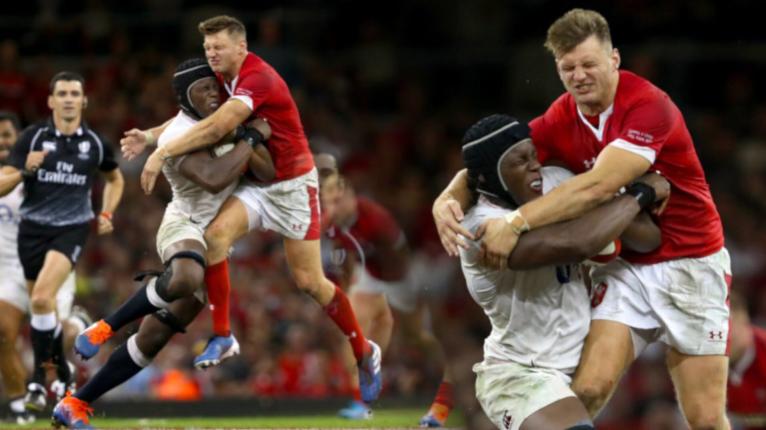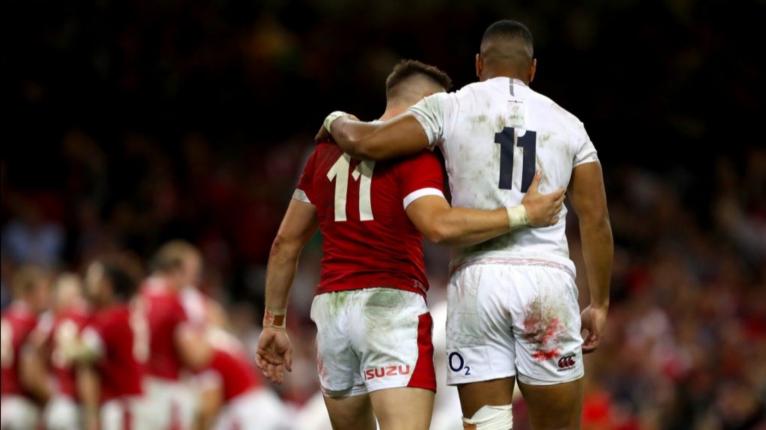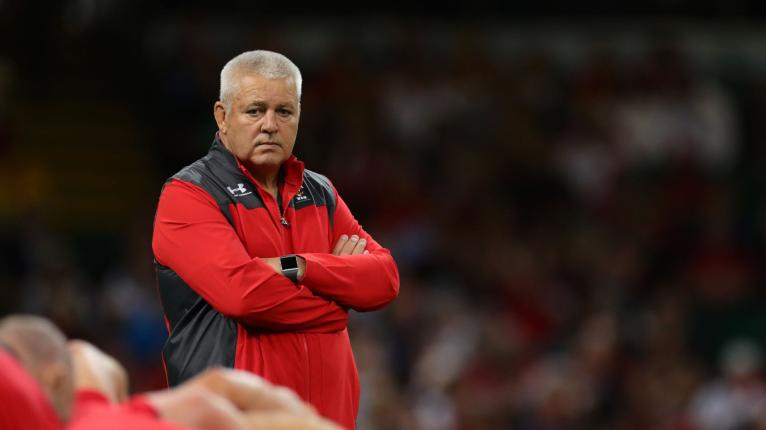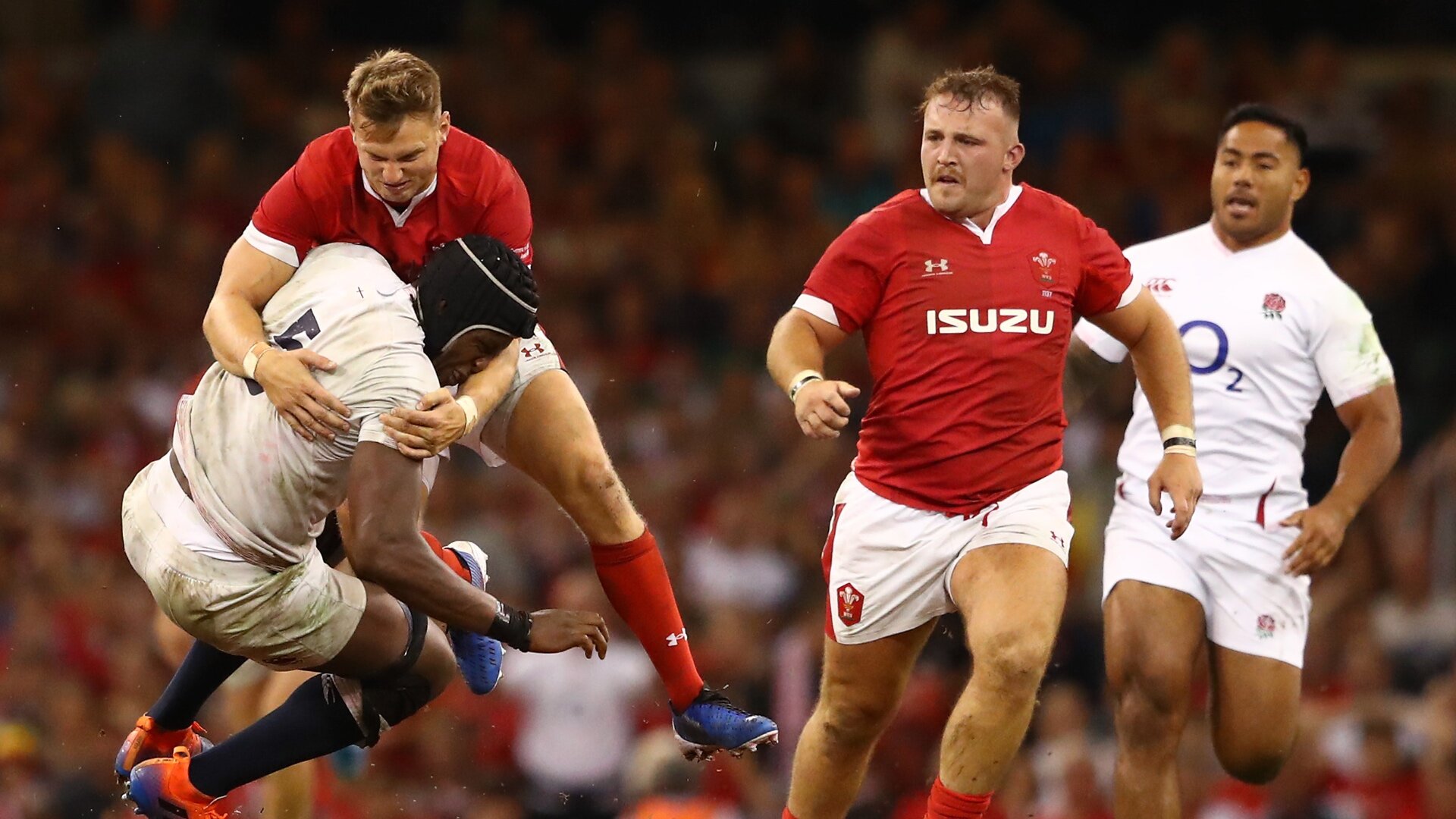The Gorseinon boy who smashed Itoje and made a Welsh legend choke on his words

English players aren’t known for winning the popularity stakes within the pulsating, partisan tiers of the Principality Stadium, but if centre Jonathan Joseph, often known as JJ, was to be pitted against his Welsh namesake, JJ Williams, it would likely be the Bath man who would be covered in bouquets while the erstwhile former Lion would in for brickbats.
Why?
Because JJ Snr spat out some ill-timed, and uncharitable comments about Dan Biggar on the eve of the match. The accusation that Wales wouldn’t have a hope of winning the World Cup with the former Osprey at the tiller was pointed and unnecessary but the teak-tough fly-half produced the sort of stirring display that saw him afforded him a hero’s reception on departing the field of play. It left him in no doubt where their affections lay.
Northampton’s pivot has had a stellar season in his new domestic home and he was saintly in his execution for 80 minutes before showing enough devilment to respond to Williams by thanking him for his motivating words. Touché.
The 29-year-old from Gorseinon, a small village to the West of Swansea, may lack the balletic footwork and instincts for playing to the line of his fallen rival, Gareth Anscombe, but what he lacks in finesse, he more than makes up for in other areas; whether it’s the regathering a hoisted ball, defensive zeal and speed of thought and deed.
His impact was pronounced against England, and not for the first time. Let’s not forget, this was a man who had kicked the winning points against England in the 2015 World Cup, a man who had grabbed the game by the scruff of the neck in March against the same opponents by rifling the ball diagonally to a gleeful Josh Adams to score on their way to a Grand Slam.
This was a man who played an integral part to Wales’ 14-match winning run.
The ‘friendly fire’ he was subjected to clearly irked him and he performed heroically.

It was Biggar, who surrounded by three English defenders, rose highest to gather a lofted Leigh Halfpenny kick in trademark fashion. Bloodied, he had to be patched up by the team doctors.
In the game’s only score minutes later, it was Biggar who had the temerity to pump the ball 50m from left to right for Josh Adams, as the yellow-carded Anthony Watson departed the field. Within seconds, the ball had been recycled, for Biggar to scan the field and spot George North screaming in space. He lofted the ball again Beauden Barrett-style, from right to left, this time, only with more subtlety, into the giant wing’s hands to canter over for his 38th Welsh try. Comedy gold was provided by Ken Owens who theatrically rued how the arch-poacher had stolen his certain glory with outstretched arms.
"Thanks to JJ Williams for the extra motivation" @WelshRugbyUnion.answered their critics with victory over @EnglandRugby, says man-of-the-match Dan Biggar#C4rugby #WALvENG pic.twitter.com/3VtFbalZOf
— Channel 4 Sport (@C4Sport) August 17, 2019
Biggar, naturally bisected the uprights from an acute angle for another two precious points.
In the second-half, when Maro Itoje, a beacon of English power clattered through a sea of bodies towards the Welsh try-line, you can guess who rose to drive his aching shoulder into the outstanding lock’s midriff. Biggar repelled him, knocking him backwards, visibly gritting his teeth as he drove him towards the turf. Five minutes later, with the clock ticking down, it was Biggar, with a gutsy if, borderline flying tackle, that brought down a bolting Itoje at full gallop on the halfway line.
He was on a personal crusade and didn’t care who knew about it.
SECRET TO SUCCESS: Dan Biggar shows us how to kick ? from seven v #ENG at Twickenham #RWC2015https://t.co/Wtiif6ifhC
— Rugby World Cup (@rugbyworldcup) September 27, 2015
Like Johnny Sexton and Owen Farrell, there is a gritty, redoubtable quality to Biggar. He once told this writer, “It’s not always about the fancy stuff, sometimes it’s about knuckling down and being a winner.” That is Biggar in a nutshell. He may have fancied himself as an amateur thespian in his formative years, but there is no doubting his battle-worn ‘cojones’.
A pinpoint Dan Biggar kick pass for a try at the Principality? We're experiencing serious Six Nations déjà vu…
George North is there to dot down, and Ken Owens to celebrate in style ?
HT #WALvENG score: 10-0
? @SkySports Action pic.twitter.com/jFHXkM8Urm
— Sky Sports Rugby Union (@SkySportsRugby) August 17, 2019
Elsewhere, Wales were happy to have restored some collective belief after it was punctured by some rampaging English behemoths six days earlier. While their set-piece was a mixed bag – the lineout was far slicker with nine successful takes in the first 20 minutes, in contrast, their scrum struggled after Tomas Francis departed – it was their vaunted defence that was restored to its snarling best.
Several times Billy Vunipola – for some, the world’s premier ball-carrier into contact – ran the ball back with intent but was shackled by defiant defence. At one point, Jake Ball, Josh Navidi, Alun Wyn Jones and Ross Moriarty surrounded him, held him up, and regained possession. The message was clear, Wales were on their patch and a wholly different proposition to the leggy, sluggish bunch that inhabited South-West London six days ago. A relieved Gatland admitted two consecutive losses to England would have been a blow to their psyche should they meet in a titanic quarter-final.
It was another player from Gorseinon, who was next to prove his worth and grow in stature as the game progressed. Leigh Halfpenny started the game with only an hour’s notice, after Liam Williams pulled up with a hamstring strain. Halfpenny had been put through two punishing fitness sessions in 24 hours prior to kick-off, including one on the morning of the game. It was also his first start for Wales in nine months after Tevita Kuridrani had knocked him into next week with a late hit. Okay, he wasn’t perfect, and misjudged a high-ball early on, but after that error, he took a handful of high-balls adroitly and grew in confidence. Late on, he survey the backfield and stuck up a Garryowen to regather and win a penalty. It was the Halfpenny of old, who danced through tackles and took the right decisions.

Gatland was happy to see him back, stating that in his opinion, he was the best positional full-back in the world.
The final hombre in Gorseinon’s power trio was Ross Moriarty who atoned for a subdued display at Twickenham with a display overflowing with fire and brimstone, clattering Vunipola’s rib-cage and offering himself as a ball carrier in the tight exchanges. It was unflashy but highly effective.
The standout player in the first-half didn’t come from Gorseinon, he came from further East; Bassaleg. Aaron Wainwright took six lineout balls cleanly and pinched a ball from Itoje. He carried aggressively around the fringes and made a nuisance of himself in Tom Curry’s absence. Gatland extolled his virtues, complementing his display at Twickenham, before drolly saying he was waiting for a 40m break from the youngster. Whisper it but the 21-year-old could end up having the sort of impact Sam Warburton had in 2011 in New Zealand, as a fresh-faced 22-year-old. Wainwright will spearhead the next generation for Wales in 2020.

In truth, Gatland cut a relieved figure after the game. He had a handful of walking wounded; James Davies had concussion, Aaron Wainwright and Jake Ball dead legs, while Gareth Davies had a knock to the hip and Biggar had a slight groin strain but there was nothing like the anguish seen in the wake of Anscombe’s cruel season-ending injury.
With a fortnight before they welcome Ireland to the Principality Stadium, it should be time to cryogenically freeze the likes of Alun Wyn Jones, Biggar, Ken Owens, Jonathan Davies and Ross Moriarty, only to unfreeze them in Japan. There is no need to take risks, Wales don’t have the squad depth to lose too many more indispensable figures. If fit, the likes of Owen Lane, Scott Williams, Owen Watkin and Hallam Amos should be given meaningful time to impress on the coaching team their worth.
Wales leave for their Turkish hot-weather training camp today and that should give the management a chance for an exhaustive brain dump with the priority how they realign in Anscombe’s absence.
As the world’s No 1 ranked team, at least for a few days, Alun Wyn Jones quipped, ‘for a nation of 3.3m people, we’re happy with that’, and he wasn’t wrong. It is an accolade to covet for there have been many dark times over the years.
The Welsh bandwagon keeps on rolling.


































